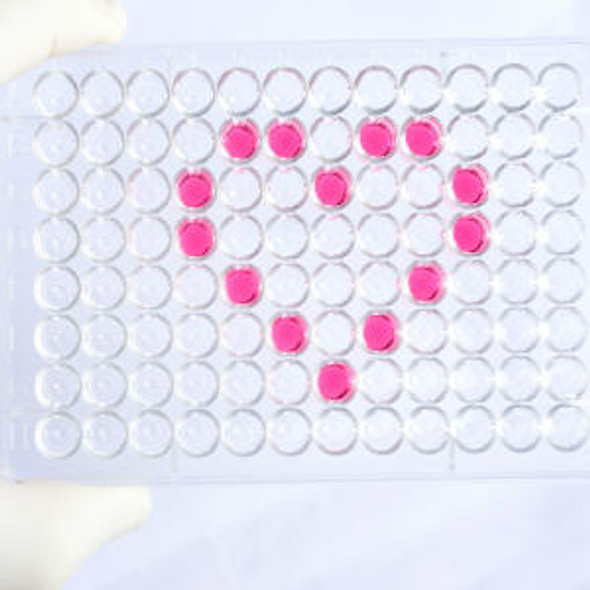Description
| Product Name: | Human NPHS2 Recombinant Protein |
| Product Code: | RPPB4118 |
| Size: | 10µg |
| Species: | Human |
| Target: | NPHS2 |
| Synonyms: | Nephrosis 2, Idiopathic, Steroid-Resistant (Podocin), PDCN, SRN1, Podocin, NPHS2. |
| Source: | Escherichia Coli |
| Physical Appearance: | Filtered White lyophilized (freeze-dried) powder. |
| Formulation: | NPHS2 was filtered (0.4�m) and lyophilized in 30mM acetate buffer and 1mM dithiothreitol, pH 4. |
| Solubility: | It is recommended to add 0.1M acetate buffer pH 4.0 to prepare a working stock solution of approximately 0.5mg/ml and let the lyophilized pellet dissolve completely. For conversion into higher pH value, we recommend intensive dilution by relevant buffer to a concentration of 10�g/ml. In higher concentrations the solubility of this antigen is limited. NPHS2 is not sterile! Please filter the product by an appropriate sterile filter before using it in the cell culture. |
| Stability: | Store lyophilized protein at -20°C. Aliquot the product after reconstitution to avoid repeated freezing/thawing cycles. Reconstituted protein can be stored at 4°C for a limited period of time; it does not show any change after two weeks at 4°C. |
| Purity: | Greater than 95.0% as determined by SDS-PAGE. |
| Amino Acid Sequence: | MKHHHHHHASVKVVQEYERV IIFRLGHLLP GRAKGPGLFF FLPCLDTYHK VDLRLQTLEI PFHEIVTKDM FIMEIDAICY YRMENASLLL SSLAHVSKAV QFLVQTTMKR LLAHRSLTEI LLERKSIAQD AKVALDSVTC IWGIKVERIE IKDVRLPAGL QHSLAVEAEA QRQAKVRMIA AEAEKAASES LRMAAEILSG TPAAVQLRYL HTLQSLSTEK PSTVVLPLPF DLLNCLSSPS NRTQGSLPFP SPSKPVEPLN PKKKDSPML |
Nephrosis 2 Idiopathic Steroid-Resistant (NPHS2) is a protein which has a role in the regulation of glomerular permeability, serving as a linker between the plasma membrane and the cytoskeleton. NPHS2 gene mutations cause steroid-resistant nephrotic syndrome.
NPHS2 Human Recombinant produced in E.Coli is a single, non-glycosylated, polypeptide chain (Val125-Leu383) containing 269 amino acids including a 10 aa His tag at N-terminus. The total calculated molecular mass is 30.2kDa.
| UniProt Protein Function: | NPHS2: Plays a role in the regulation of glomerular permeability, acting probably as a linker between the plasma membrane and the cytoskeleton. Defects in NPHS2 are the cause of nephrotic syndrome type 2 (NPHS2). It is a renal disorder characterized clinically by childhood onset of proteinuria, hypoalbuminemia, hyperlipidemia, and edema. Kidney biopsies show non-specific histologic changes such as focal segmental glomerulosclerosis and diffuse mesangial proliferation. The disorder is resistant to steroid treatment and progresses to end-stage renal failure in the first or second decades. Some patients show later onset of the disorder. Belongs to the band 7/mec-2 family. 2 isoforms of the human protein are produced by alternative splicing. |
| UniProt Protein Details: | Protein type:Membrane protein, integral Chromosomal Location of Human Ortholog: 1q25.2 Cellular Component: protein complex; integral to plasma membrane; endoplasmic reticulum; plasma membrane; intercellular junction; lipid raft Molecular Function:protein binding Biological Process: actin cytoskeleton reorganization; excretion Disease: Nephrotic Syndrome, Type 2 |
| NCBI Summary: | This gene encodes a protein that plays a role in the regulation of glomerular permeability. Mutations in this gene cause steroid-resistant nephrotic syndrome. Alternative splicing results in multiple transcript variants. [provided by RefSeq, Jul 2014] |
| UniProt Code: | Q9NP85 |
| NCBI GenInfo Identifier: | 12230467 |
| NCBI Gene ID: | 7827 |
| NCBI Accession: | Q9NP85.1 |
| UniProt Secondary Accession: | Q9NP85,Q8N6Q5, B1AM32, B1AM33, |
| UniProt Related Accession: | Q9NP85 |
| Molecular Weight: | 34,421 Da |
| NCBI Full Name: | Podocin |
| NCBI Synonym Full Names: | nephrosis 2, idiopathic, steroid-resistant (podocin) |
| NCBI Official Symbol: | NPHS2�� |
| NCBI Official Synonym Symbols: | PDCN; SRN1�� |
| NCBI Protein Information: | podocin |
| UniProt Protein Name: | Podocin |
| Protein Family: | Podocin |
| UniProt Gene Name: | NPHS2�� |
| UniProt Entry Name: | PODO_HUMAN |






